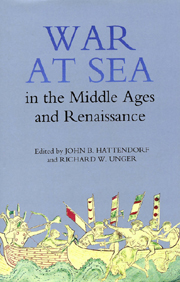Book contents
- Frontmatter
- Contents
- List of illustrations
- List of Contributors
- Preface
- Acknowledgements
- Introduction: Theories of Naval Power: A. T. Mahan and the Naval History of Medieval and Renaissance Europe
- I Northern Europe
- II Southern Europe
- III Sixteenth and Early-Seventeenth-Century Europe
- Conclusion: Toward a History of Medieval Sea Power
- Index
- Titles in the series
Introduction: Theories of Naval Power: A. T. Mahan and the Naval History of Medieval and Renaissance Europe
Published online by Cambridge University Press: 05 April 2013
- Frontmatter
- Contents
- List of illustrations
- List of Contributors
- Preface
- Acknowledgements
- Introduction: Theories of Naval Power: A. T. Mahan and the Naval History of Medieval and Renaissance Europe
- I Northern Europe
- II Southern Europe
- III Sixteenth and Early-Seventeenth-Century Europe
- Conclusion: Toward a History of Medieval Sea Power
- Index
- Titles in the series
Summary
ONE of the interesting phenomena in naval historical study during the twentieth century was the curious way in which ideas attributed to the American naval officer, Alfred Thayer Mahan, permeated, for a time, nearly every aspect of Anglo-American writing on naval history. His thought even influenced historical thinking about the medieval and Renaissance periods, eras that he never even considered in his own writing. Thus, in thinking about the previous literature on maritime and naval affairs in Europe between the tenth and seventeenth centuries, one needs to start with a clear understanding of Mahan's place in the development of naval thought, to see both its contributions and its limitations, while understanding that interpretations of Mahan's work have also changed.
Mahan was certainly the most widely influential naval writer and theorist of the past century. In the years between the mid-1880s and his death in 1914, he wrote the fundamental books and articles that clearly established a distinctly Anglo-American theory of naval power, or in the words that he popularised, ‘sea power’. Over the past century, his work has had immense influence on naval scholarship around the globe. With Britain's Royal Navy and the United States Navy as the successive and dominant superpower navies of the twentieth century, it is not entirely surprising that scholars have used Mahan's writings as a benchmark in their understanding of naval power and maritime conflict.
- Type
- Chapter
- Information
- War at Sea in the Middle Ages and the Renaissance , pp. 1 - 22Publisher: Boydell & BrewerPrint publication year: 2002



